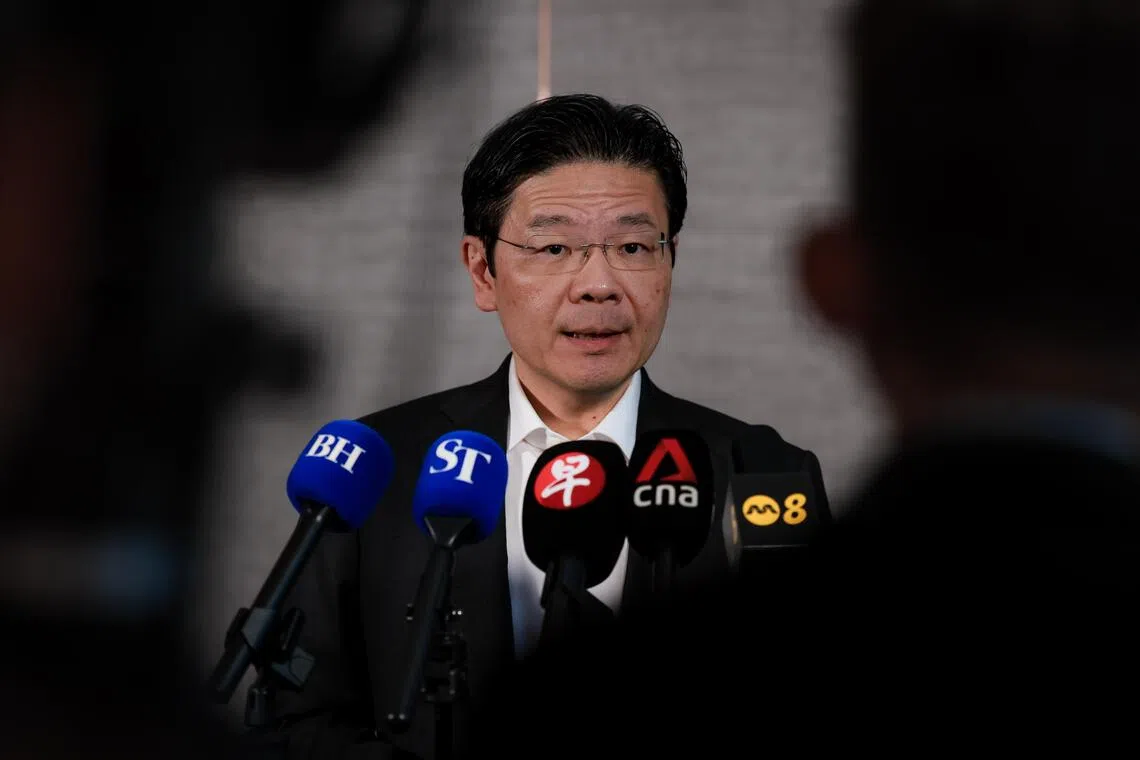‘Silver lining’ amid dark clouds, as Asean recognises need to deepen unity, says PM Wong
Sign up now: Get insights on Asia's fast-moving developments

Prime Minister Lawrence Wong speaking to reporters on Oct 28.
ST PHOTO: GAVIN FOO
- PM Wong highlights Asean leaders' unity amid global uncertainty, focusing on deeper integration and cooperation to strengthen the region's economy.
- Asean expanded with Timor-Leste joining as the 11th member, marking a historic milestone, but further economic integration steps are needed.
- Asean is committed to Defa and Atiga upgrades for digital trade and streamlined customs; Singapore will support future chairs to maintain momentum.
AI generated
KUALA LUMPUR – Amid the dark clouds of geopolitical uncertainty, there is a silver lining for Asean – that its leaders recognise more clearly than ever the need to be more integrated and united, said Prime Minister Lawrence Wong.
He pointed to what he called “considerable steps forward” for the grouping in the past year, including Asean’s historic expansion to include Timor-Leste
These underscore an urgency to make its single market “that much more competitive and attractive to investments”, and also to be united.
“There will be issues, there will be differences, but we cannot afford to be divided. We cannot afford to allow disputes to split Asean apart. And I think (it’s) good that there is a very strong sense of commitment towards that.”
Speaking to reporters after the close of the 47th Asean Summit and related meetings in Kuala Lumpur, PM Wong said this renewed sense of shared purpose comes even as major powers jostle and old rules of engagement fade.
The atmosphere in the meetings suggested that there is “continued strong desire” among Asean leaders to accelerate integration and keep Asean united, he said.
When asked what is at stake if Asean is not unified, PM Wong said: “Everything is at stake because we don’t know what shape this new equilibrium will be.”
In this transitory phase, cooperation does not “magically happen” – and it is up to South-east Asia to start doing it on its own.
“We in Asean have to start bringing about these new habits, new norms, new practices, new models of cooperation,” he said.
“We have to do it internally within Asean, and we have to put in place the relevant frameworks for Asean to lead the engagement with other countries outside of Asean,” he added, noting that another key achievement in 2025 was forging and expanding links with external partners such as Brazil, Canada and South Africa.
PM Wong noted positive engagements with newly elected leaders such as Thai Prime Minister Anutin Charnvirakul and Japanese Prime Minister Sanae Takaichi, with whom he plans to meet later in 2025.
He also said Asean had stepped up its engagement with traditional partners too, such as the United States, China, Japan and Australia.
Under Malaysia’s chairmanship – which PM Wong said he congratulated Prime Minister Anwar Ibrahim and the country for – Asean made history by enlarging its ranks for the first time in 26 years, with Timor-Leste formally joining as the organisation’s 11th member.
The island-nation of 1.3 million people, which gained independence in 2002 after decades of conflict and foreign occupation, first applied for membership in 2011 and received in-principle approval in 2022, paving the way for its admission into a 700-million-strong community across South-east Asia.
PM Wong described Timor-Leste’s entry as a historic milestone that “completes our Asean family” after more than a decade of preparation. But he noted that accession is only the beginning of the journey.
“Being accepted into Asean is just the first step,” he said. “They will still need to take steps to integrate their economy with the rest of Asean to fully maximise the benefits of being part of Asean.”
He added that Singapore will do its part to help Timor-Leste integrate and build capacity, and that he is looking forward to visiting the country.
PM Wong said Malaysia’s chairmanship also saw progress in other key areas, including the substantial conclusion of the Asean Digital Economy Framework Agreement (Defa)
Launched in 2023, Defa is Asean’s flagship effort to boost cross-border digital trade by setting common standards for e-commerce, data flows, digital payments and cyber security. Expected to be finalised and signed in 2026, it will serve as a blueprint for integrating the region’s fast-growing digital economies.
The upgraded Atiga, meanwhile, will further liberalise trade and improve Customs procedures, helping businesses move goods more easily across borders.
Such initiatives will bring member states’ economies closer and open new opportunities in trade, digital services and green industries, PM Wong noted.
“We will continue to take further steps to integrate our economies further. It may not be a big bang, and it may seem incremental to some, but what is important is that we are continuing to move in the right direction,” he said.
Turning to the future of Asean, PM Wong said the spirit of continuity among successive Asean chairmanships is critical to maintaining momentum. He said Singapore will support the Philippines, which assumes the chairmanship in 2026, and continue that momentum when it takes on the role itself in 2027.
“If each successive chair can build on what the preceding one does, then Asean will continue to stay strong, even more united, and we can secure a brighter future for everyone in the region,” he said, adding with a smile that Singapore “is already taking notes”.



